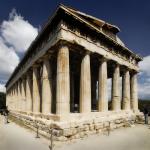|
This section contains 241 words (approx. 1 page at 300 words per page) |

|
Cattle Lands. A region in central Greece bordering on Attica, Boeotia was named after its large cattle pastures. The area consisted of the two plains of Orchomenos and Thebes, both of which were good wheat land. In the second half of the sixth century, a Boeotian League of many small towns came into being and issued a common coinage. In the Classical Period (480-323 B.C.E.) the number of cities and towns had shrunk to about a dozen, controlled in varying degrees by the largest city, Thebes.
War Prosperity. On the whole the Boeotians were a self-contained agricultural people who did not share the overseas expansion of Greece. Boeotian farms were prosperous, and the land was regarded as rich. The Boeotians profited from the economic difficulties of Athens, their neighbor to the southeast, during the Second Peloponnesian War (431-404 B...
|
This section contains 241 words (approx. 1 page at 300 words per page) |

|




